
Exposé Online
What's old
Exposé print issues (1993-2011)
- 1 (October 1993)
- 2 (February 1994)
- 3 (May 1994)
- 4 (August 1994)
- 5 (October 1994)
- 6 (March 1995)
- 7 (July 1995)
- 8 (November 1995)
- 9 (March 1996)
- 10 (August 1996)
- 11 (February 1997)
- 12 (May 1997)
- 13 (October 1997)
- 14 (February 1998)
- 15 (July 1998)
- 16 (January 1999)
- 17 (April 1999)
- 18 (November 1999)
- 19 (May 2000)
- 20 (October 2000)
- 21 (March 2001)
- 22 (July 2001)
- 23 (December 2001)
- 24 (April 2002)
- 25 (September 2002)
- 26 (February 2003)
- 27 (August 2003)
- 28 (December 2003)
- 29 (April 2004)
- 30 (September 2004)
- 31 (March 2005)
- 32 (September 2005)
- 33 (May 2006)
- 34 (March 2007)
- 35 (January 2008)
- 36 (October 2008)
- 37 (July 2009)
- 38 (July 2010)
- 39 (Summer 2011)
Features
From Canterbury with Love —
Meet Syd Arthur
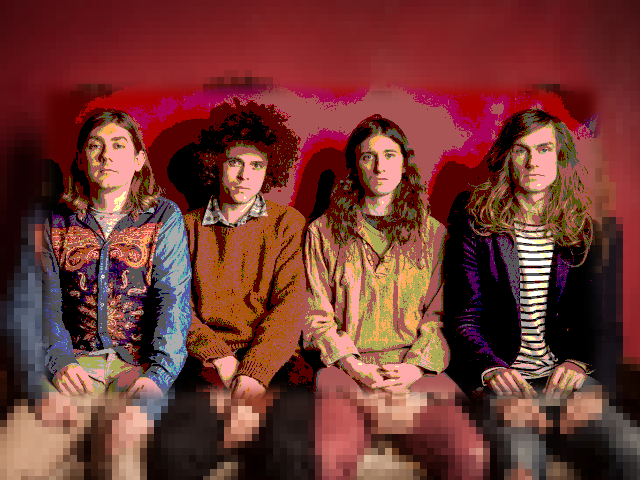
It’s only been a few quick years since Syd Arthur emerged from obscurity to claim the mantle of heirs apparent to the legacy of revered progressive outfits such as Caravan, Soft Machine, and Gong. Their debut LP, On an On, was released in 2012, and its heady mixture of psych, jazz, blues, folk, and rock, made the band an instant hit on the sprawling UK festival scene. It didn’t take long for these four young lads from Canterbury to gain the attention of festival organizers across the pond and in 2013 they picked up new fans at SXSW and Coachella.
by Paul Hightower, Published 2014-05-26
Their second album, Sound Mirror, was released in the US on May 20th, the same day the band kicked off a tour as support for Sean Lennon’s Ghost of a Sabre Tooth Tiger (aka GOASTT). The entire album was also made available as a stream on Stereogum.
I sat down with Liam Magill (guitar, lead vocals), Joel Magill (bass, backing vocals and Liam’s brother), Raven Bush (mandolin, synths, violin, backing vox and Kate’s nephew), and Fred Rother (drums) before they went on stage at the Great American Music Hall in San Francisco. Many thanks to the band’s manager Kevin Morris and their publicist Chris Vinyard for coordinating and facilitating this brief introduction to Syd Arthur.
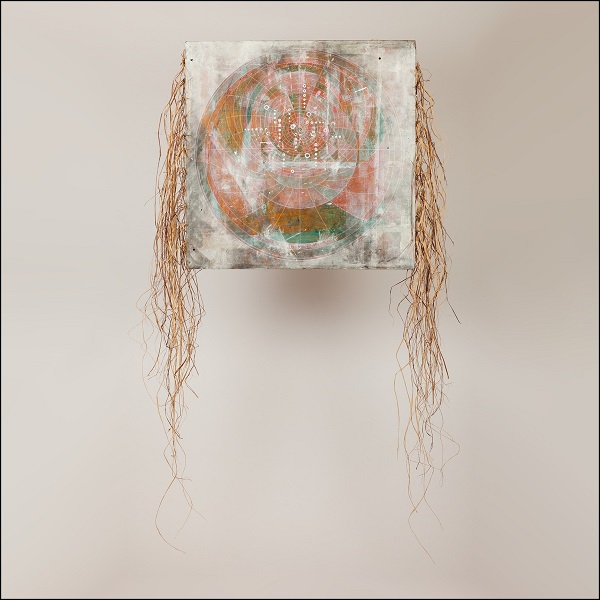 I don’t think many of our readers know who you are, so why don’t you give me a brief backstory.
I don’t think many of our readers know who you are, so why don’t you give me a brief backstory.
Raven Bush: I think it’s the classic tale of friends growing up at school together, and getting into music together and playing and starting to gig around Canterbury really. We played in all the pubs and clubs around Canterbury and then starting to spread out from there.
Are you all from Canterbury?
RB: Yeah. We all grew up there, went to school there.
If someone were to ask “What defines the Syd Arther sound or style?" what would you tell them?
Liam Magill: Well there’s definitely a psychedelic element in there. It’s definitely eclectic. We’re into contrasting rhythms and melodies. It’s hard to define it as just one thing.
Give me some top influences.
RB: Obviously the Canterbury bands have been an influence and still are. We’ve got a very broad listening palette.
In fact, someone called you guys “the one-band Canterbury scene revival.” What stuck out to me was not the Canterbury scene revival part, but the one band part. That tells me that there are not a lot of other people in the UK doing this.
LM: Not really. We’ve struggled to find similar acts along the way to be playing with, but we found some and there are some in that vein.
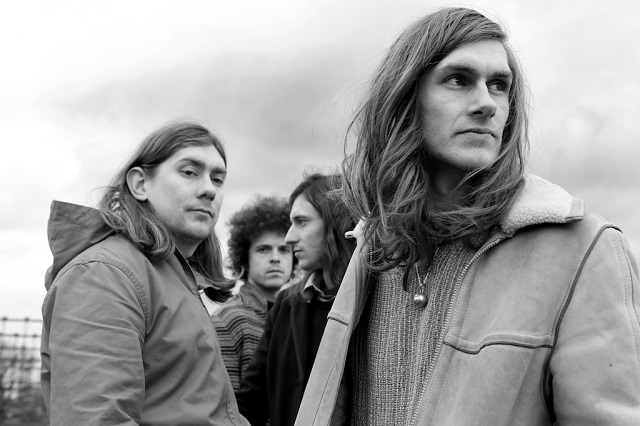 Do you find that it’s an emerging scene, or do you find you’re the lone rangers?
Do you find that it’s an emerging scene, or do you find you’re the lone rangers?
LM: I wouldn’t say there’s an emerging scene. There’s lots of good music happening, but it’s not necessarily like progressive or Canterbury or whatever.
There is an up and coming psychedelic thing that’s happening, which is great, and we tap into that to a certain extent. It’s definitely Canterbury-centric, though.
But the psych thing has been around for a while, right? Going back to Ozric Tentacles.
All: Yeah.
So there’s been that scene, it’s just been kind of there. You guys are able to tap into that.
All: Yeah.
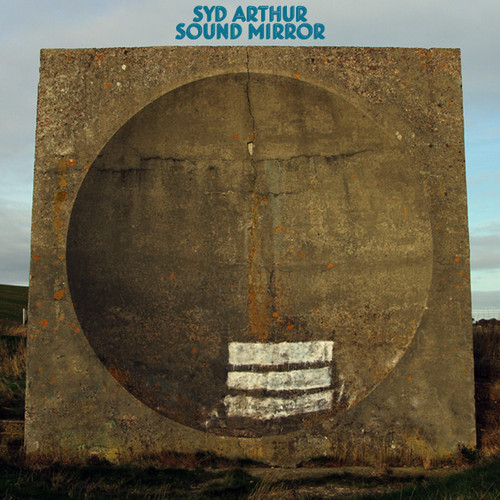 Let’s talk about the new album. It’s a bit of a departure from what you were doing on the first album. It’s not as overt in terms of referencing the old Canterbury stuff. Would you agree? (to Raven) I think you’re doing a little more electronics…
Let’s talk about the new album. It’s a bit of a departure from what you were doing on the first album. It’s not as overt in terms of referencing the old Canterbury stuff. Would you agree? (to Raven) I think you’re doing a little more electronics…
RB: Yeah, and maybe more strings and keys.
Less violin.
RB: Yeah, less solo violin stuff, like lead violin, whatever you call it. Just enjoying writing string arrangements more.
Was that on purpose? We’re you trying to say let’s not repeat ourselves, and go off and do something slightly different?
LM: Yeah, just trying to hone everything and make it more succinct.
RB: And also, the last record we made... well, the one before last, was kind of the first record we’d felt like we were really proud of. We’d done some EPs before, and so we learned so much because we recorded ourselves, and produced ourselves, and up until the last record mixed ourselves.
So approaching it differently, I really believe a record is very different to live, you know? So the stuff that you can jam out and explore live — I think — maybe is better to be distilled in a more succinct way, or in a different way, or should be approached differently on a record. So that was definitely conscious.
But rather than say, “I want to do strings, or electronics...” that was the point.
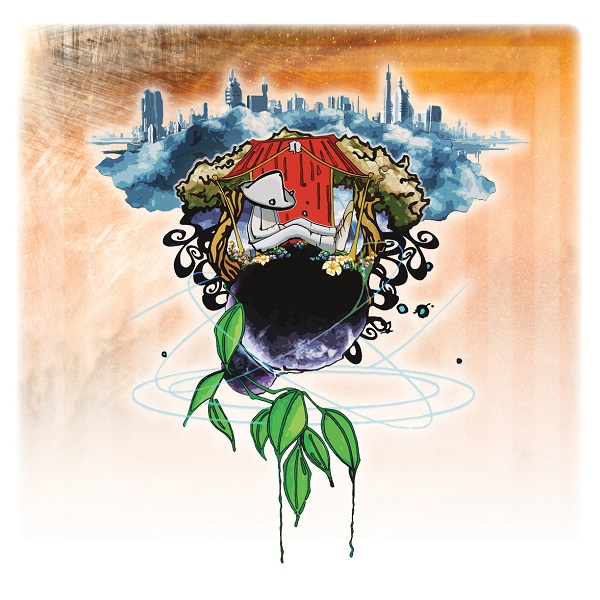 A lot of people list On an On as the first record, but it’s not really, right?
A lot of people list On an On as the first record, but it’s not really, right?
Joel Magill: It’s the first record for us, really. There’s an EP before that.
Was it just an EP? I thought it was a full length album.
JM: Moving World, it’s five or six tracks.
And when did that come out?
JM: The year before, so 2011.
LM: Yeah, it was part of the whole process of On an On, really. It was stuff that would have been on there but they got released previous — prior to On an On.
Were you self-managed at that point?
LM: Yeah. Until this last year we’ve kind of been an in-house band, kind of running everything.
And once you signed with Harvest...
LM: We signed with Harvest last year — summer. And hooked up with management here in America as well.
Has that helped?
LM: Yeah, it helped to fund the making of Sound Mirror. And the studio. We did it in our place, so we needed to invest in that to get it up to spec for the next record.
JM: And being here right now. That definitely wouldn’t have happened.
LM: The support and respect they’ve given us has been great.
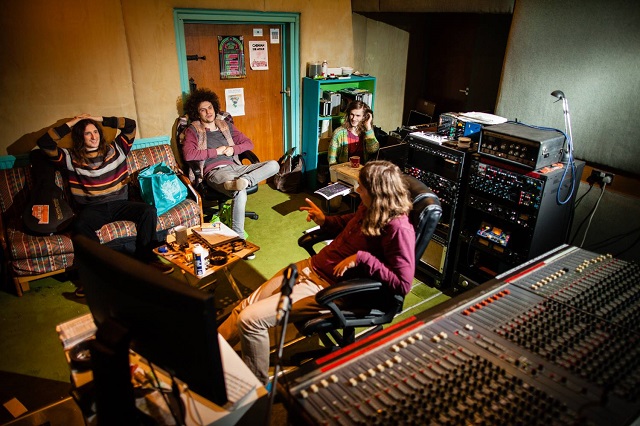 You guys recorded On an On yourselves in your own studio?
You guys recorded On an On yourselves in your own studio?
LM: Yeah. Self-released in England as well.
Where was it recorded?
RB: In southeast London. Well, basically Kent.
In your own studio?
All: Yeah.
And this time you actually wanted to go into a proper studio…
RB: No, it’s the same place.
Oh really?
LM: We recorded it all ourselves, literally. We were in there for a month, two months. Just us four. No one else.
Is the material on the new album, is that all new or is any of that stuff holdovers from On an On?
LM: It’s all pretty new.
JM: Yeah, the oldest track is “Garden of Time.”
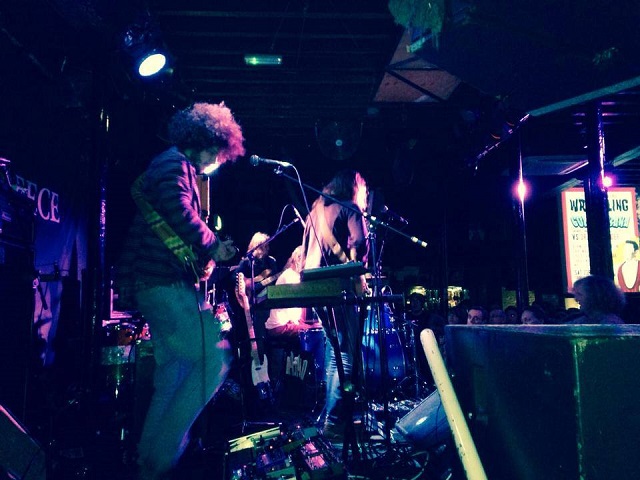 So do you find there’s any themes on the new album that are born out of the experiences you’ve had since you made the last one? Some of the touring, maybe? I know you’ve been over to the states since then.
So do you find there’s any themes on the new album that are born out of the experiences you’ve had since you made the last one? Some of the touring, maybe? I know you’ve been over to the states since then.
LM: Yeah, it all sort of feeds into the pot, really. Touring, gigging, getting out there and meeting people. It all goes back in and influences in its own way.
Are you the primary songwriter, Liam?
LM: In a way, yeah, but it’s a collaborative thing, you know? The tune’s not finished and complete until everyone has had their input.
It’s a pretty short album by today’s standards. Even by vinyl standards. Was that on purpose? Or are you holding anything back to feed the pipeline?
JM: We just went in and it came out like that.
LM: We don’t want to make too long a record, you know? We feel like that’s a good amount of time. The last record was perhaps a little bit longer.
JM: The nice thing is it doesn’t feel short when you listen to it, which is quite nice.
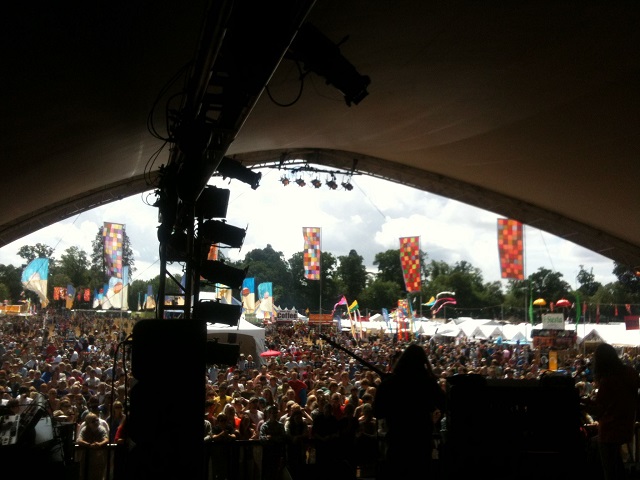 Because each of the songs is fairly dense.
Because each of the songs is fairly dense.
JM: Yeah. So I think that’s quite nice and refreshing.
Actually it is. People often complain, “70 minutes — gah!”
JM: Yeah. To be honest, we’re all quite strong believers that vinyl — 42, 44 minutes — is the ultimate length.
Yeah, that seems to be as much as the human attention span can really suck up... The Stereogum stream — you didn’t do that last time, right?
RB: No.
Is that something the management helped you set up, or is that something you guys came up with?
JM: A bit of both, I think. I get into bands that way. I’ve heard of someone, and you hear one song it’s hard to know. I don’t really use Spotify or anything like that, but I will check out a stream of a record online in my own time. So yeah, I think it’s a collaborative decision, and when the opportunity came it was like, “yeah, great.” You know, just spread it. Get as many people to hear it as possible.
 So is that part of what bands have to do these days? You’re embracing the idea of “Well, it’s going to get out there anyways so we’re going to make ourselves known. Let’s share it to the world hopefully generate some interest that way.”
So is that part of what bands have to do these days? You’re embracing the idea of “Well, it’s going to get out there anyways so we’re going to make ourselves known. Let’s share it to the world hopefully generate some interest that way.”
RB: Yeah, a band in our stage is definitely not about holding anything back. It’s about letting everything go as quickly and as freely as you can.
JM: That’s true. I think for On an On even I was the one with the little torrent... swish!
Oh, really?
JM: A good quality torrent. Back in the day when we self-released it. Yeah, if people are going to find it I’d rather they listen to it in good quality.
RB: Yeah, ’cause we’re definitely in a transitional phase where, especially when you make an album. That’s why vinyl is becoming popular again because it’s this thing that you can’t copy. But a CD still is this digital thing, so if you get it you can get it. Whether you pay for it or you download it. But come check us out live, that’s where something’s going to happen that you can’t copy digitally.
Has vinyl always been part of your release strategy?
LM: When we can afford it, yeah.
JM: On an On was the first time we were in a position like, “We believe in this record. We know people are going to appreciate it on vinyl.” And we really felt like we wanted to commit it to vinyl. In the beginning we were like “we don’t know if anyone is going to want this on vinyl,” so we sold it as a pre-order before it was released, and then instantly we had enough money to press it. We’ve done subsequent pressings.
LM: Yeah, thanks to the fans and support from people that helped us get it on vinyl.
 Does pirating have an effect on you guys at this point? Have you noticed that it’s cut into any of your sales? Because if you look at the guys in the prog scene at the other end, a lot of them are just giving up. They’re bailing because they’re saying “I can’t deal with the fact that so much of my music is being grabbed for nothing. I need to make a living off of this.” But you’re not really sensing any of that happening to you?
Does pirating have an effect on you guys at this point? Have you noticed that it’s cut into any of your sales? Because if you look at the guys in the prog scene at the other end, a lot of them are just giving up. They’re bailing because they’re saying “I can’t deal with the fact that so much of my music is being grabbed for nothing. I need to make a living off of this.” But you’re not really sensing any of that happening to you?
RB: No, we don’t rely on record sales. You’ve got to be out gigging.
It’s the live stuff.
RB: Yeah, the live stuff, and there’s other types of merchandise. We’re definitely in a transitional phase, so at this point there’s no point in getting hung up about that ’cause that’s the way it is, right?
Let’s talk about the touring. You’ve been to the United States before, and it looks like this time you’re actually going to be going across the entire country, from west to east. Are you looking forward to this? Have you been prepped, do you know what you’re in for?
LM: We’ve had ten years of prep. We’ve been going for a decade. We’ve been gigging for a decade, so yeah. We’re really excited to be out here and doing an extensive tour of cities we’ve never seen or been to, so we’re super excited about it. And happy to be with Sean as well, and supporting those lots.
Have you had to do some of the same kind of traveling on previous tours?
JM: Well we’re definitely going to be doing the most miles we’ve ever done, just because of the size of America. In England it’s a two, three, four hour drive. Out here there’s some big drives, but also some small ones, you know?
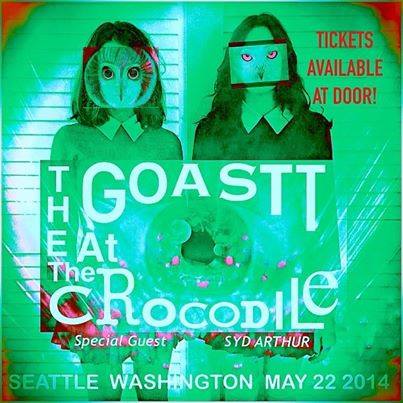 In the old days, it seems like doing these American tours was a make or break endeavor for a lot of young bands when they came from England. King Crimson — it broke that group up. Whereas with Jethro Tull and Yes it kind of made them, because they were playing the college circuit. The college circuit doesn’t really exist here anymore. You’re pretty much doing shows like this: you’re doing theaters in various cities across the country. And then you head back and will you pick up the tour in Europe when you get home?
In the old days, it seems like doing these American tours was a make or break endeavor for a lot of young bands when they came from England. King Crimson — it broke that group up. Whereas with Jethro Tull and Yes it kind of made them, because they were playing the college circuit. The college circuit doesn’t really exist here anymore. You’re pretty much doing shows like this: you’re doing theaters in various cities across the country. And then you head back and will you pick up the tour in Europe when you get home?
LM: It’s festival season in England, so we’re playing some festivals and stuff.
JM: I think when we head back it’s just promo for the record. Obviously we’re here, the album was released today.
Today – congratulations!
All: Thanks.
JM: And it’s released in England like a week later or something but we’re not around, so when we get back it’s kind of straight into that for a few weeks.
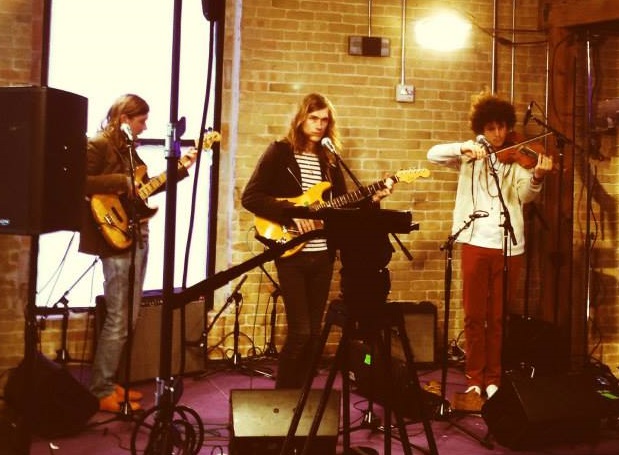 How about the media? I know that the BBC has given you guys some exposure and you got to shoot a video out here in New York. Are you getting any other media interest, while you’re here in the states?
How about the media? I know that the BBC has given you guys some exposure and you got to shoot a video out here in New York. Are you getting any other media interest, while you’re here in the states?
RB: Yeah, we’re doing a session for Sirius, a live session for them. Kevin (the band’s manager) said the record got serviced to the radio stations only about a couple of weeks ago so it’s starting now. People are getting into it. It’s feeding out into all the college radio and stuff.
Do you have a sense of where its market is in the states? Have they tried to figure out where’s the best place to... I mean, the prog scene is its own thing but I assume you’re going to be trying to get into some other markets. Is it the college scene? Does that seem to be the way to go?
LM: Yeah, definitely.
RB: We hope to get it played to a wide range of audiences. Because we’ve absorbed a lot of different kinds of music, and there’s a lot of different styles that end up in our sound. So hopefully it can span across different genres and different age groups as well.
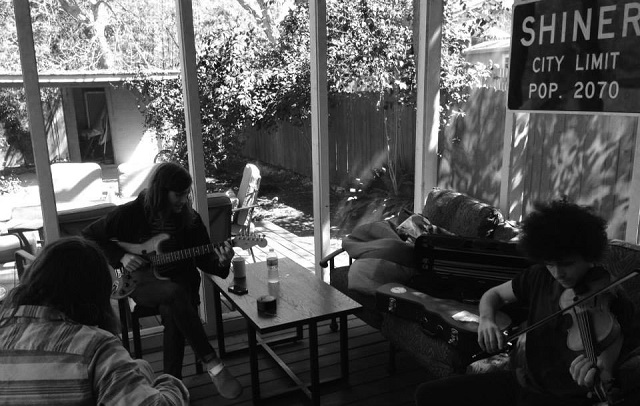 Is that because of the Canterbury background? You come from this area where music has always had this crazy blending of folk and jazz and the rock stuff, and English and European continental stuff. It all blends together. Do you feel that coming from Canterbury has helped you come up with that style? Whereas had you come from the north it would have been totally different.
Is that because of the Canterbury background? You come from this area where music has always had this crazy blending of folk and jazz and the rock stuff, and English and European continental stuff. It all blends together. Do you feel that coming from Canterbury has helped you come up with that style? Whereas had you come from the north it would have been totally different.
RB: It’s definitely inspiring. We actually started making music quite a while before we discovered the Canterbury bands, so we were already on that path and that was sort of inspiring. It was like “Here are bands who were from this area and doing similar things.” Essentially it’s just about having an open mind and pushing song writing, really. Like wanting to get really nice instrumental passages into a three and a half minute song. More diverse time signatures and chords, and just a yearning for stretching the songwriting to be bigger than just four chords or whatever.
And the media back home, the print and radio — they’re OK with that? Because it wasn’t a long time ago when that approach to music was considered not OK.
RB: We’ve had quite good support, generally. There’s still quite a lot of magazines in England and in Europe who have been supportive.
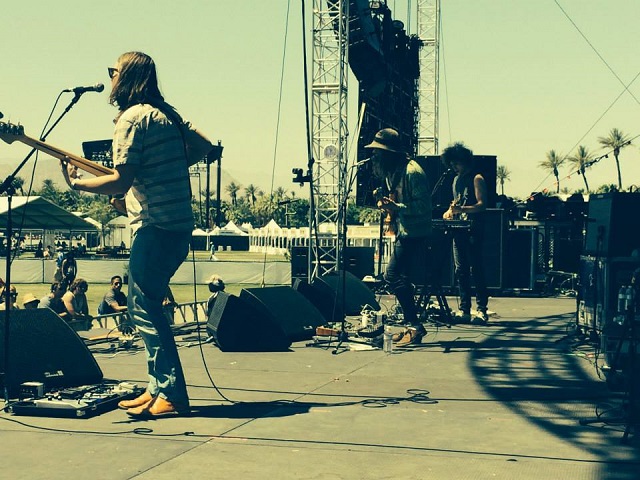 So I know you guys got your start in the festival scene in England, and that’s been a really good avenue for you to get yourself heard by a lot of people at the same time. And now you’ve come over and started on the festival scene here as well. How do you compare them?
So I know you guys got your start in the festival scene in England, and that’s been a really good avenue for you to get yourself heard by a lot of people at the same time. And now you’ve come over and started on the festival scene here as well. How do you compare them?
LM: Well, we’ve played Coachella and SXSW... I think that’s the two. That’s the only two festivals we’ve played in the states so far.
You’re going to do Bonnaroo, right?
LM: Yeah. So it’s hard to sort of compare at the moment. We’ve done lots and lots in England, so I don’t know...
Not enough data.
LM: Yeah, not enough data yet really to make a comparison.
JM: I’m really looking forward to Sasquatch. I hear that’s great. A similar vibe to what we expect in England and Europe.
Are any of you involved in projects outside of Syd Arthur?
RB: I do various things, yeah. Before we got really busy with Syd Arthur I was doing lots of session work and stuff. I think we all do bibs and bobs. But right now the focus for sure is Syd.
And I know you do solo gigs, Liam.
LM: Yeah, more traditional style, in pubs or wherever. Small, little intimate gigs. Acoustic stuff, yeah.
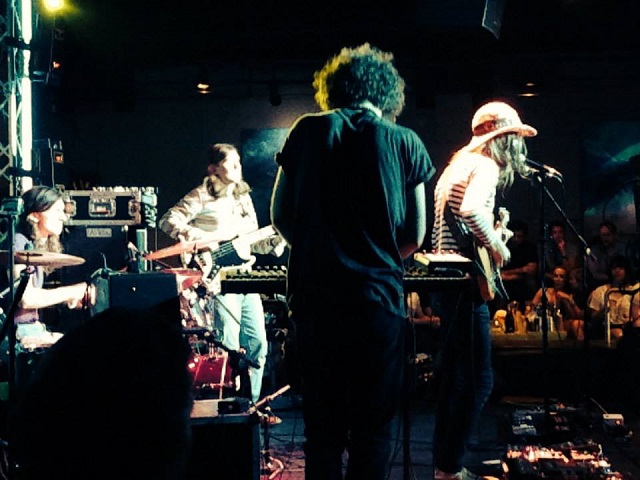 Has anyone from the old Canterbury scene taken notice of you? Have the Sinclairs called you up and said, “We love what you’re doing!”
Has anyone from the old Canterbury scene taken notice of you? Have the Sinclairs called you up and said, “We love what you’re doing!”
LM: That would be cool, man. We’ve got a lot of respect for those guys.
RB: There are connections.
It’s just interesting, because now those guys are starting to pass away, right? The drummer for Caravan...
LM: Richard Coughlan.
JM: Hugh Hopper as well, a few years ago.
So you feel like this is a torch that’s worth picking up and carrying?
LM: Definitely.
RB: It’s just the music in general. I don’t think it’s specifically Canterbury.
Well, Canterbury itself was so diverse within itself. Everything from Soft Machine to Caravan, there was quite a bit of range right there.
RB: Yeah.
So you feel that gives you a ton of freedom to come up with whatever you want.
RB: Yeah, definitely.
Pictures mostly borrowed from the Syd Arthur Facebook page.
Filed under: Profiles, Interviews
Related artist(s): Syd Arthur
More info
http://www.sydarthur.co.uk
http://www.facebook.com/sydarthur
What's new
These are the most recent changes made to artists, releases, and articles.
- Review: Tin Pan Alley - Tin Pan Alley
Published 2026-03-05 - Release: The Stratos Ensemble - Freeing Form
Updated 2026-03-04 23:06:09 - Review: LeoNero - Monitor
Published 2026-03-04 - Review: Sterbus - Black and Gold
Published 2026-03-03 - Release: Janel Leppin's Ensemble Volcanic Ash - Pluto in Aquarius
Updated 2026-03-02 15:06:51 - Release: Janel Leppin - Slowly Melting
Updated 2026-03-02 15:05:27 - Release: Alister Spence - Always Ever
Updated 2026-03-02 15:04:11 - Release: Let Spin - I Am Alien
Updated 2026-03-02 15:02:41 - Review: Falter Bramnk - Vinyland Odyssee
Published 2026-03-02 - Review: Exit - Dove Va la Tua Strada?
Published 2026-03-01 - Review: Steve Tibbetts - Close
Published 2026-02-28 - Release: We Stood Like Kings - Pinocchio
Updated 2026-02-27 19:24:02 - Release: Stephen Grew - Pianoply
Updated 2026-02-27 19:20:11 - Release: Thierry Zaboitzeff - Artefacts
Updated 2026-02-27 00:16:46 - Review: Kevin Kastning - Codex I & Codex II
Published 2026-02-27 - Release: Zan Zone - The Rock Is Still Rollin'
Updated 2026-02-26 23:26:09 - Release: The Leemoo Gang - A Family Business
Updated 2026-02-26 23:07:29 - Release: Ciolkowska - Bomba Nastoyashchego
Updated 2026-02-26 13:08:55 - Review: Immensity Crumb - Chamber Music for Sleeping Giants
Published 2026-02-26
